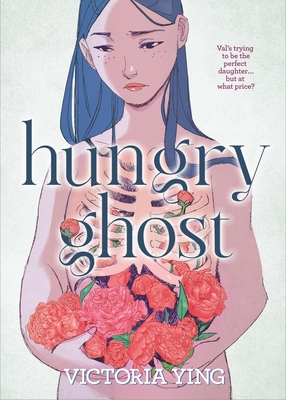Teen struggles with eating disorder in gorgeous, moving graphic novel from critically acclaimed author and artist
 Pasadena, CA – Disney and DC artist and author Victoria Ying pulls at readers’ heartstrings and explores her past in the poignant YA graphic novel, “Hungry Ghost” (April 25, 2023, Macmillan/First Second). Ying has seen tremendous success with many of her works, including DC’s “Diana Princess of the Amazons,” and fans will rejoice in the new story and its moving imagery.
Pasadena, CA – Disney and DC artist and author Victoria Ying pulls at readers’ heartstrings and explores her past in the poignant YA graphic novel, “Hungry Ghost” (April 25, 2023, Macmillan/First Second). Ying has seen tremendous success with many of her works, including DC’s “Diana Princess of the Amazons,” and fans will rejoice in the new story and its moving imagery.
Valerie Chu is quiet, studious, and above all, thin. No one, not even her best friend Jordan, knows that she has been binging and purging for years. But when tragedy strikes, Val finds herself taking a good, hard look at her priorities, her choices, and her own body. The path to happiness may lead her away from her hometown and her mother’s toxic projections—but first she will have to find the strength to seek help.
“Hungry Ghost is heartbreaking, hopeful, and frank about figuring out how to love yourself and even the people in your life who might stand in the way of that self-love. It’s a beautiful, compelling book.” — Trung Le Nguyen, creator of The Magic Fish
“Victoria Ying gives us an unflinching look at eating disorders and loss in this heartbreaking story about learning to love yourself.” — Lily Williams, creator of Go With The Flow
“Such a beautiful, tragic, uplifting story about friendship and love. I wish I could have read this when I was a kid, but I’m also grateful that I’ve read it now. I’ll be thinking about its message for a long time.” — MariNaomi, creator of Distant Stars
“Hungry Ghost”
Victoria Ying | April 25, 2023 | Macmillan/First Second | YA graphic novel
Hardcover | 978-1250766991 | $25.99
Paperback | 978-1250767004 | $17.99
More about Victoria Ying
 Victoria Ying is a critically acclaimed author and artist living in Los Angeles. She started her career in the arts by falling in love with comic books, this eventually turned into a career working in animation and graphic novels. She loves Japanese Curry, putting things in her shopping cart online and taking them out again and hanging out with her husband and furry friends. Her film credits include Tangled, Wreck it Ralph, Frozen, Paperman, Big Hero 6, and Moana. She is the illustrator on DC’s “Diana Princess of the Amazons” and the author and illustrator of “City of Secrets,” and the sequel “City of Illusion” in stores everywhere! Her upcoming graphic novel projects include the sequel to “Diana Princess of the Amazons” and a YA debut, “Hungry Ghost.” Find out more about her at www.victoriaying.com.
Victoria Ying is a critically acclaimed author and artist living in Los Angeles. She started her career in the arts by falling in love with comic books, this eventually turned into a career working in animation and graphic novels. She loves Japanese Curry, putting things in her shopping cart online and taking them out again and hanging out with her husband and furry friends. Her film credits include Tangled, Wreck it Ralph, Frozen, Paperman, Big Hero 6, and Moana. She is the illustrator on DC’s “Diana Princess of the Amazons” and the author and illustrator of “City of Secrets,” and the sequel “City of Illusion” in stores everywhere! Her upcoming graphic novel projects include the sequel to “Diana Princess of the Amazons” and a YA debut, “Hungry Ghost.” Find out more about her at www.victoriaying.com.
Follow Victoria on social media:
Facebook: @artofvictoriaying | Twitter: @victoriaying | Instagram: @victoriaying
In an interview, Victoria can discuss:
- Why this story is important to her and her personal recovery story
- Balancing being an artist and an author
- Her storytelling process and how it has evolved through her projects
- Disordered eating in the Asian-American community and raising awareness around the issue
- How the pandemic affected her writing and health
An Interview with Victoria Ying
How did you transition from making art into storytelling?
I was always told by my father to write my own stories, but I was too scared to do so when I was a young artist, I wanted to just work on other people’s stories, but after working at Disney for 8 years and watching the storytelling process, I wanted to speak my own truth and tell the stories that I had inside of me.
How would you describe your art style and artistic process?
My art style is all over the place. I’ve always had an interest in exploration, so I try to use art techniques that match the tone of the story that I’m working on. Diana was a very fluid and simple style, while Hungry Ghost is a scratchier, more mature, but anxious style.
Recovery looks different for everyone. Can you tell us a little bit about your experience and why you decided to share a story that was so personal to you?
Recovery often looks one way because of how it is portrayed in the media. We often see a thin white girl who’s family is horrified at her revelation, but that was not my experience and in my desperation to be seen, I wrote this book.
Was creating this story of Valeria therapeutic for you?
This story flowed out of me in a way that no other writing has. I had an experience close to what happened in the book and I had to get it out. I wrote it as fiction because there are elements that speak to a larger truth than just the facts and processing it as fiction has been helpful.
The start of COVID-19 and lockdown was hard for a lot of people, but you mentioned that it made you reevaluate yourself and your body. How so?
I was in recovery for ED, but I hadn’t really made peace with my body or food. I was still dieting and over-exercising at the start of the pandemic, but I had made a commitment to change myself for the better and that meant addressing my mental health. During the pandemic, the freedom of having to see people, of having outsiders or friends or family judge my appearance went away and that space helped me to recover.
How can people make space for those with marginalized bodies?
While my story stars a thin character, I want it to be known that many if not most of the people suffering from Disordered Eating and disordered behaviors are often people we don’t expect. People often make judgments about what people’s lifestyle habits are just by looking at them and we often encourage people in larger bodies to engage in disordered eating because we see thin as being healthier. In my experience, I was the sickest when I was thinnest and we need to see people in larger bodies and their experiences with disordered eating as just as valid as those of thin people.

A former award-winning journalist with national exposure, Marissa now oversees the day-to-day operation of the Books Forward author branding and book marketing firm, along with our indie publishing support sister company Books Fluent.
Born and bred in Louisiana, currently living in New Orleans, she has lived and developed a strong base for our company and authors in Chicago and Nashville. Her journalism work has appeared in USA Today, National Geographic and other major publications. She is now interviewed by media on best practices for book marketing.
